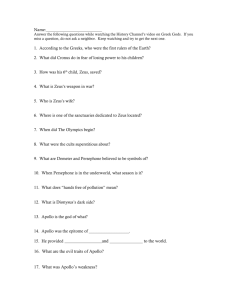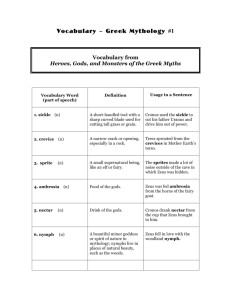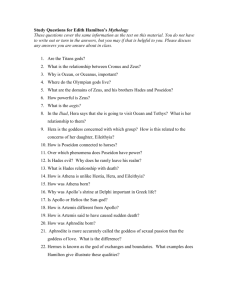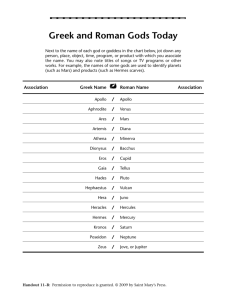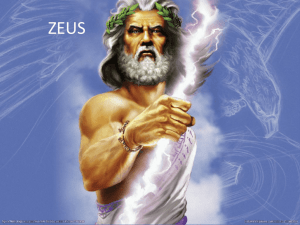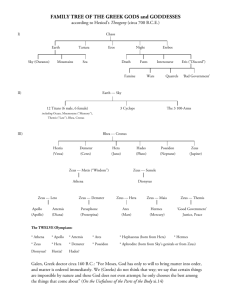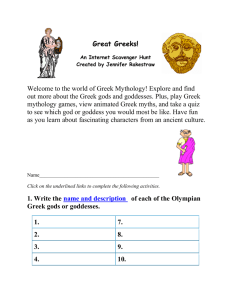Qtr. 3 Exam Review
advertisement
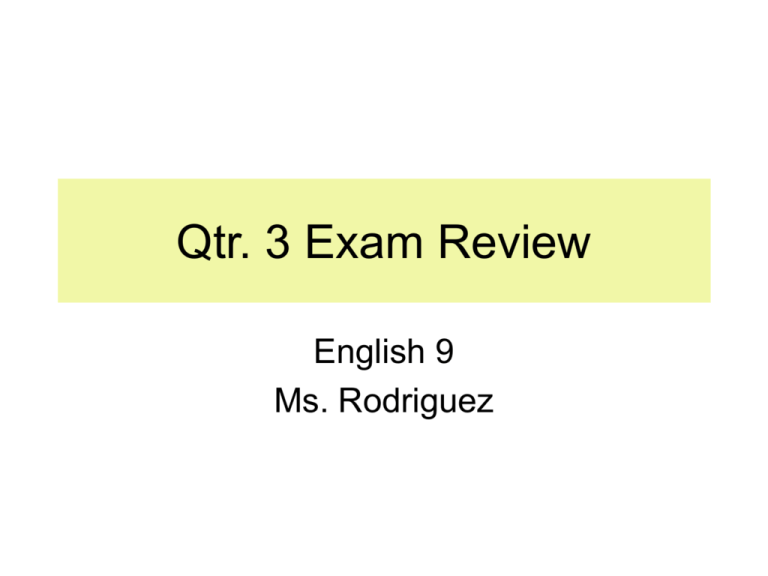
Qtr. 3 Exam Review English 9 Ms. Rodriguez Why did ancient Greeks tell myths? • The ancient Greeks told a lot of myths. • It was a way for the ancient Greeks to explain the unexplainable in a terrifying world. • Myths helped to explain death, birth, and natural disasters. *Where do the gods live? What did it inspire? * All gods lived on Mt. Olympus which is what inspired the ancient Greeks to create the Olympics. Zeus • God of gods, goddesses, and humankind; enforcer of justice; ruled the sky. • Rhea tricked Cronus into swallowing a rock wrapped in a baby’s blanket. She hid him in a cave where he was secretly raised until he grew up to be strong and powerful so that he could overthrow his father. More Zeus • Zeus was able to free his siblings by secretly giving his father medicine that made him throw up his fully grown siblings. • His symbols are lightning(thunderbolt) and the eagle. Cronus Duties, Powers, god of/other: • Cronus was a titan and the top god before the Olympians. • As prophesied, he became the top god after defeating his father, the Sky. • There was a prophecy that one of his kids would kill him and take over. • He swallowed all his children, except for Zeus because a prophecy predicted one of his offspring would overthrow him. Cronus Important Family Members: • Cronus was the Son of mother Earth and the Sky. • His wife was the titan, Rhea. • He was the father of Zeus, Poseidon, Hera, Hestia, Hades, and Demeter. Appearance/Symbols: • Most of the time he is shown swallowing a baby or a rock. • Cronus’ symbol is a scythe and is surrounded by lightning. Hephaestus Birth Story: 1) One story goes that he was thrown off Mt. Olympus by Hera at birth because he was ugly and deformed. 2) Another story says Hephaestus was born normal. Zeus threw him from Mt. Olympus the one time he sided with his mother in a fight between his parents. *Both stories say he fell for a whole day and landed on an island where a sea goddess nursed him back to health. Important Family Members: • Hephaestus was the son of Zeus and Hera. • He was half-brother to Artemis, Apollo, Ares, Athena, Dionysus, and Hermes. • His wife is Aphrodite. Hephaestus Appearance/Symbols: • Hephaestus is usually depicted as being crippled and not so handsome, but having a strong muscular, upper body. • He is also shown with a hammer or other tools a blacksmith would use. • His symbols are fire and tools associated with blacksmiths like the hammer. Hephaestus Duties, Power, god of/other: • Hephaestus was the god of fire, smithing, and metalworking. • He is associated with volcanoes which are where his workshops are located. • His wife, Aphrodite, had an affair with his brother, Ares. Apollo Birth Story: • Zeus impregnated the titan, Leto. • Hera, Zeus’ jealous wife, chased Leto all over the earth so she couldn’t find a place to give birth. • Leto gave birth to Apollo and his twin, Artemis, on the floating island of Delos. • Apollo was delivered by his twin sister, Artemis. Apollo Important Family Members: • Son of Zeus and Leto, a titan. • His twin sister was Artemis. • His half siblings were Hermes, Athena, Ares, and Dionysus. Appearance/Symbols: • Apollo is shown as a young, handsome, and physically fit man with a rays of light emanating from him. • Symbols and he wears a laurel wreath in his lightly long hair usually holding a bow and arrows and/or a lyre. Apollo Duties, Powers, god of other: • Apollo is the god of prophecy, oracles, healing, disease, music, song, poetry, and archery. • He is the protector of male virgins. • Both Apollo and his twin Artemis could bring sudden death and disease to males and females respectively. Artemis Birth Story: • Same as her twin brother, Apollo. Important Family Members: • Same as Apollo’s. Appearance/Symbols: • Young physically fit woman wearing a toga, holding a bow and arrows. • She wearing crescent moon band in her hair. • Appears with animals like a dog or deer. • Symbols: bows, arrows, crescent moon. Artemis Duties, Powers, goddess of/other: • Goddess of the hunt, wilderness and wild animals, childbirth, protector of female virgins. • Could bring sudden death and disease to females. Poseidon Birth Story: • Poseidon was one of the children that Cronus swallowed. • Cronus throws up Poseidon and his siblings after he is tricked into swallowing poison. • He joins Zeus and fights with his siblings against Cronus and the titans. They win and become the Olympians. Poseidon Important Family Members: • Poseidon was the son of Cronus and Rhea. • He was a brother to Hestia, Hera, Demeter, Hades, and Zeus. Appearance/Symbols: • Shown as older man with long white hair and a long white beard with a horse and/or dolphins whose face is typically shown as angry and moody. • The symbol Poseidon is always shown with is his trident which is a spear with three points. • He uses the trident to break rocks, to start and end storms, to create earthquakes, and other natural disasters. Poseidon Duties, Powers, god of/other: • Poseidon is the god of the sea, rivers, flood and drought, earthquakes, and horses. • He created horses. • Poseidon is considered the friend or foe of mariners. Hermes Duties, Powers, god/other: • Hermes is the messenger god. • He is also known as the god of animal husbandry, roads, travel, hospitality, diplomacy, trade, thievery, language, writing, persuasion, trickery, athletic contests, gymnasiums, sleep, astronomy, and astrology. • Hermes was responsible for leading the souls of the dead to the Underworld. Hermes Duties, Powers, god/other: • While still a baby, Hermes ran away, stole some of Apollo’s cows and killed them. He also found a giant tortoise and killed it, too. He made the first lyre from the tortoise shell and cow skins. • When Apollo found out that Hermes killed some of his cows he went after him but changed his mind when he heard the lyre. Demeter • Parents are Cronus and Rhea. Siblings are Hestia, Hera, Hades, Poseidon, and Zeus. • Demeter was the goddess of the earth and of agriculture. She also controlled the seasons. • Her daughter, Persephone, was kidnapped by and forced to marry Hades. She is only allowed to leave the Underworld to be with her mother 9 months out of the year. When Persephone has to return to the Underworld, Demeter mourns her loss which brings on season of winter. Demeter • Demeter is shown as a maternal figure who is wearing a garland of corn-ears or a ribbon. • Her symbols are a scepter, corn ears, a poppy flower, torch, and/or a mystic basket which represent agricultural harvest. Ares Duties, powers, god of/other: • God of war. • He had an affair with Hephaestus’ (his brother) wife, Aphrodite. • Loved chaos and destruction in war. Would cry and run away if his side was losing. Aphrodite • Goddess of love and beauty. • She emerged as a fully grown goddess from an opened shell, floating on the sea. • She has no known parents. • Aphrodite had an affair with her husband’s (Hephaestus) brother, Ares. Hera • Wife of Zeus (See Poseidon for parents and siblings). • Hera is described as very jealous and vindictive due to her husband’s frequent infidelities. • Goddess of fidelity and guardian of married women (probably because she understood the difficulty of being with an unfaithful husband). • Her symbols are the peacock and peacock feathers. Athena • Zeus turned Metis into a fly while she was pregnant and swallowed her. Nine months later Zeus started getting a very bad headache. Hephaestus cracked Zeus’ head open with an axe and Athena came out of his head fully grown. • Goddess of wisdom, war craft and skills. She would rather have peace than war.Excellent strategist and always dominated in war. • She is shown with a shield and wearing a helmet. Her symbol is an owl, which shows her watchfulness and wisdom. Hades • Persephone is his wife. (See Poseidon for Important Family Members). • Drew the lot of ruling the Underworld. • Hades could bring a person back to life (remember “Orpheus and Eurydice”?). • Hades is shown as being unhappy, holding keys (like a jailer) and sometimes with a pitchfork. Dionysus • Semele wanted to see in his true form and prove that he was god. Being human, Semele burned to death but before she was fully consumed, Zeus was able to rescue his unborn son and sew him into his thigh. • Known as the god of merriment (party god), wine, and reincarnation. Medusa 19. What was Medusa before she became a monster? -A beautiful virgin priestess of Athena who had many suitors. 20. What happened to Medusa?Was it her fault?Who changed her into a monster? -She was raped by Poseidon in Athena’s temple even though it wasn’t her fault.Instead of protecting Medusa, Athena changed her into a monster. More Medusa 21. What does Medusa look like after Athena transforms her? -Her hair turns into snakes; skin, eyes, tongue, and body resemble a human corpse. More Medusa 22. What is Athena’s curse? -Men who looked upon her were turned into stone and she would be alone for the rest of her life. 23. Who is the hero that goes out to kill Medusa? -Perseus Grammar • Nouns: person, place, thing, or idea mom, San Francisco, table, love • Verbs: Action words to walk, walking, walked • Adjectives: It’s describing word. She is a sweet, happy person More Grammar *punctuation: End a sentence with a period, question mark, or exclamation point. *capitalization: Start your sentence with a capital letter. *comma: Use a comma to separate the day and year when you write the date. Use commas to separate items in a list. Literary Terms • Moral: Social and/or life lesson in the story. • Myth: Traditional stories that usually explain a belief or a natural phenomenon. • Archetype: Very old patterns or images that recur over and over again in literature such as characters, plots, animals, or setting (i.e. sacrificial hero). Literary Terms • Internal Conflict: A struggle between opposing needs, desires or emotions within a person. For example, Junior’s feelings of financial inadequacy before, during and after the dance. • External Conflict: A character’s struggle against an outside force, i.e., Joker vs. Batman. • Epic: A long narrative poem that tells the great deeds of a hero, i.e., “The Odyssey.” • Epic Hero: The main character of an epic, i.e. Odysseus.
